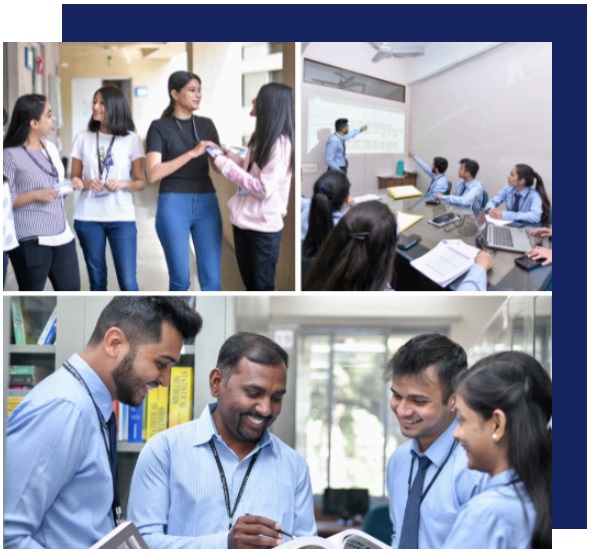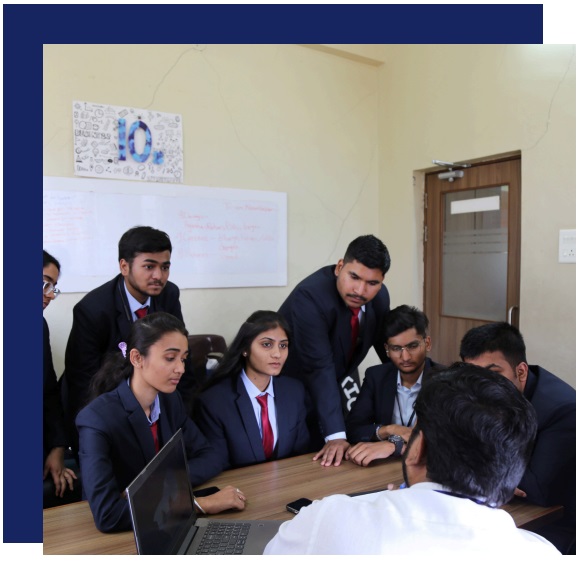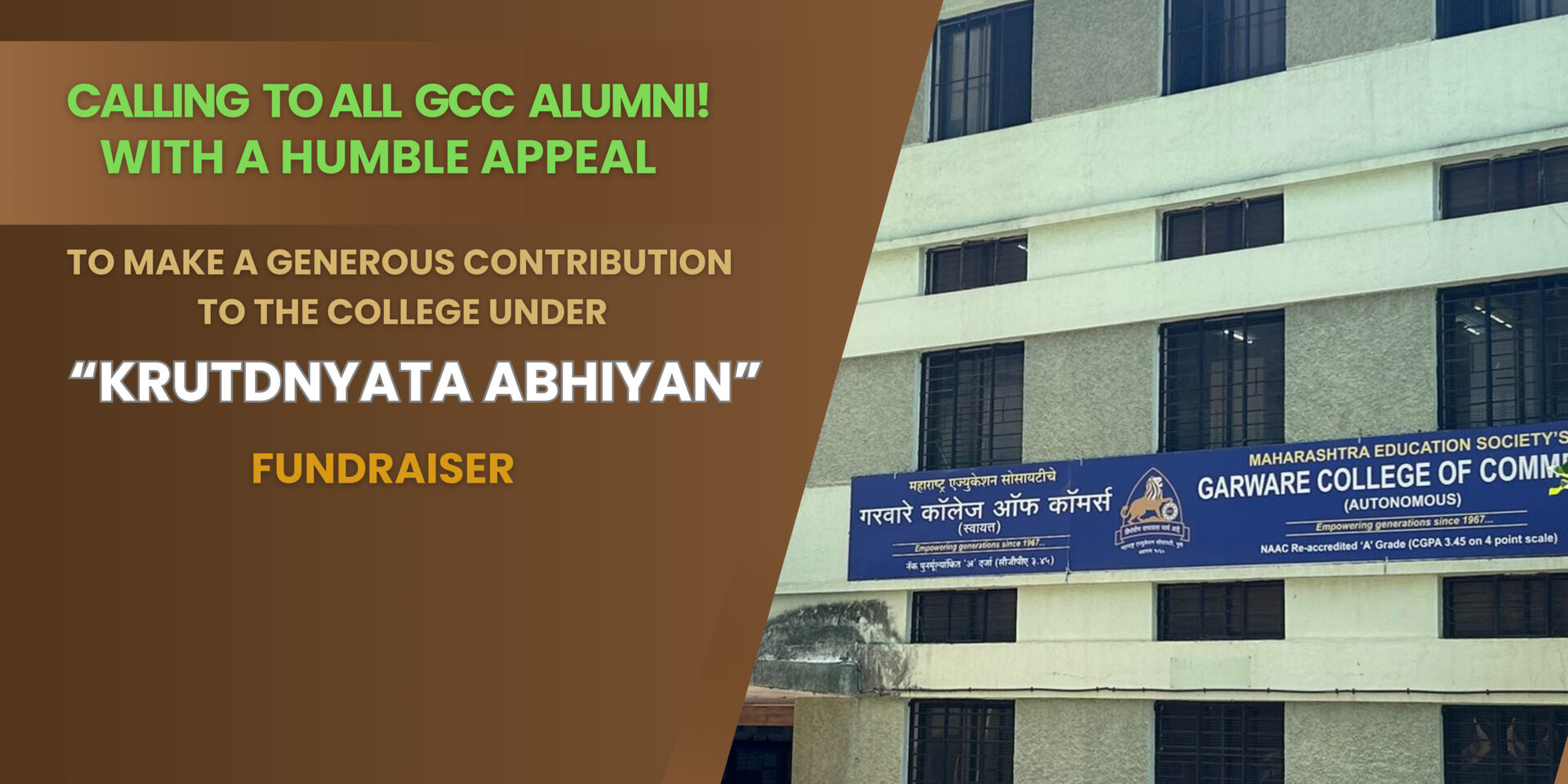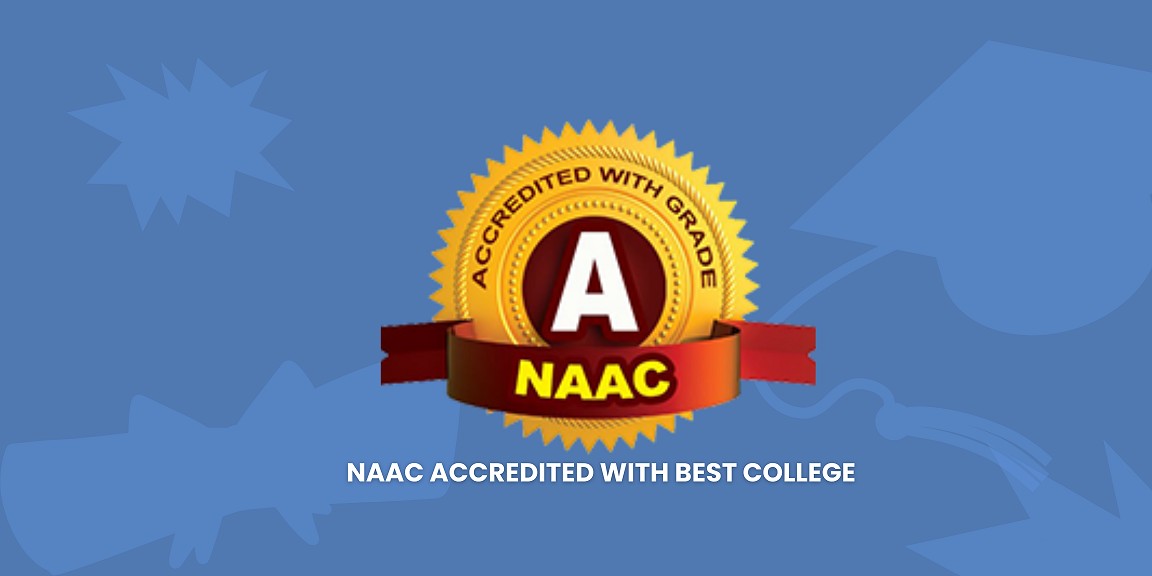Empowering Minds,
Igniting Commerce Excellence
WHAT IS B. COM?
Bachelor of Commerce (B.COM) is a 3-year full-time degree programme designed with a vision to provide industry relevant education in the field of Commerce and Economics.
The New Framework of the B.COM Programme focuses on the learner centric teaching-learning process, which provides the opportunity to explore and get equipped with knowledge, skills and attitude necessary for gainful employment in the corporate world and for entrepreneurship, along with knowledge in core areas of Accounting, Economics, Corporate Laws, Business Management and more.


Why to choose GCC?
- Versatile and Adaptable Curriculum
- Practical Learning Approach
- Strong Industry Relevance
- Business Skills Development
- Accounting & Taxation Understanding
- Financial Analysis Skills
- Business Management Knowledge
- Marketing Strategy & Data Analysis insights
- Diverse Career Opportunities
NEP ALIGNED CURRICULUM
1 year : Certificate
2 years : Diploma
3 years : Degree
Specialisations in B.com
As per the curriculum of
NEP 2020, B.COM has seven specialisations:
Cost and Work accounting
Banking and Finance
Business Administration
Marketing Management
Business Entrepreneurship
Business Law Practices
Vocational Tax (Non-Grant)
THINGS YOU SHOULD KNOW
PROGRAMME DURATION
B.COM is a programme
with a duration of 3-year
full-time.INTAKE CAPACITY - GRANT
FY:- 600 students
SY:- 600 students
TY:- 600 studentsINTAKE CAPACITY - NON-GRANT
FY:- 120 students
TIMING
*ELIGIBILITY
12th EXAMINATION (10+2)
Eligibility of a candidate for admission is Higher Secondary School Certificate (10+2) or its equivalent Examination with English.
OR TWO YEARS DIPLOMA
Two Years Diploma in Pharmacy after HSC, of Board of Technical Education conducted by Government of Maharashtra or its equivalent.
OR THREE YEARS DIPLOMA
Three Years Diploma Course after S.S.C. i.e. 10th standard. of Board of Technical Education conducted by Government of Maharashtra or its equivalent.
Intermediate Commerce/Arts examination from the Board of Secondary Education, M.P. Bhopal with 4 subjects including General English.
Students who have completed H.S.C. Vocational are also eligible.
*As per Savitribai Phule Pune University (SPPU) Guidelienes
LEARNING SYSTEM
- At Garware College Of Commerce, we focus more on Quality Education than Quantity Education and provide opportunities to succeed.
- We help students to understand different concepts in innovative ways.
- We have good digital infrastructure like Projectors at every classroom of GCC and several well-equipped Computer Laboratories to make learning interesting and interactive.
- We also have a departmental and digital library with 64,000+ books and 320+ e-books for all our students so that the learning process is relentless.
Strategic & Analytical Thinking
Communication Skills
Problem-Solving Skills
Financial Acumen
Teamwork

Time Management
Adaptability
Computer Proficiency
Leadership Skills
Sales
CAREER OPPORTUNITIES
Accounting and Auditing
Banking and Finance
Marketing
Insurance
Entrepreneurship
Human Resources
Information Technology
Retail
- To develop conceptual understanding and fundamental knowledge in core areas and various disciplines of Commerce and Economics.
- To equip the students with updated and practical knowledge of commerce and industry through project-based learning.
- To develop the global competencies among students by providing engaging learning experience with increased emphasis on creativity, independent critical thinking and research.
- To provide the liberty to earn choice-based credits by facilitating synchronous, independent, and experiential learning platforms for development of interpersonal, entrepreneurial, corporate skills, and enhancement of employability among the learners.
- To serve the diverse interests of learners and develop multidisciplinary skills through add on & value-added courses, as well as co-curricular, extra-curricular & extension activities.
- To enhance employability by developing a strong industry-oriented learning ecosystem.
STANDARD OF PASSING:
- The Semester End Examination will be conducted for 60 marks
- Continuous Comprehensive Evaluation (CCE) will be conducted for 40 marks.
- Thus for each paper the examination will be for 100 marks for the semester.
- The passing in the paper will require 40 marks out of 100 marks, in which minimum 24 marks out of 60 marks in the semester end examination are a must. Thus passing in CCE is not compulsory but will be complementary for passing in the paper of said semester.
- A student is declared “pass” if he or she obtains a minimum of 40% marks in Semester End Examination and in internal examination. In case of the shortfall of marks in internal examination , a student will have to make over the shortage of marks in the Semester End Examination. It means it is necessary that a student gets minimum 40 marks out of 100 marks (40 marks of internal examination +60 marks of Semester End examination). For the Semester End examination separate or independent passing is a must it means that student has to get 24 marks out of 60 marks. It also means, there is no separate passing in Internal Examination but there is separate passing for Semester End Examination and for the final result of a paper a student must have to obtain 40% marks out of total 100 marks for the said paper.
- Backlog Internal Examination will be conducted for the students whose Aggregate percentage is less than 40% in particular paper but pass in Semester end examination.
Distribution of Credits
Distribution of total credits for Three Years B.Com. Programme (2021 pattern) is as follows:-
| Sr.No. | Nature of Courses | Semesters (Credits) | Total (Credits) | |||||
| I | II | III | IV | V | VI | |||
| 1 | Core Course | 06 | 06 | 09 | 09 | 09 | 09 | 48 |
| 2 | Core Course Practical | 04 | 04 | 04 | 04 | 04 | 04 | 24 |
| 3 | Generic Elective Course | 09 | 09 | 03 | 03 | -- | -- | 24 |
| 4 | Discipline Special Elective Course | -- | -- | 04 | 04 | 08 | 08 | 24 |
| 5 | Skill Enhancement Course | 01 | 01 | -- | -- | -- | 02 | 04 |
| 6 | Ability Enhancement Compulsory Course | 03 | 03 | 02 | -- | -- | -- | 08 |
| Sub Total | 23 | 23 | 22 | 20 | 21 | 23 | 132 (Grand Total) | |
Distribution of total credits for Three Years B.Com. Programme (2021 pattern) (for Vocational Taxation only) is as follows :-
| Sr.No. | Nature of Courses | Semesters (Credits) | Total (Credits) | |||||
| I | II | III | IV | V | VI | |||
| 1 | Core Course | 06 | 06 | 09 | 09 | 09 | 09 | 48 |
| 2 | Core Course Practical | 04 | 04 | 04 | 04 | 04 | 04 | 24 |
| 3 | Generic Elective Course | 03 | 03 | -- | -- | -- | -- | 06 |
| 4 | Discipline Special Elective Course | 08 | 08 | 08 | 08 | 08 | 08 | 48 |
| 5 | Skill Enhancement Course | 01 | 01 | -- | -- | -- | 02 | 04 |
| 6 | Ability Enhancement Compulsory Course | 03 | 03 | 02 | -- | -- | -- | 08 |
| Sub Total | 25 | 25 | 23 | 21 | 21 | 23 | 138 (Grand Total) | |
Abbreviations and Meaning of various terms used
- Course - A “Course” is a component of a Programme, so in the new system, papers will be referred to as courses. Each course is identified by a unique course code. While designing curriculum, courses can have defined weightages. These weightages are called Credits. Each course, in addition to having a syllabus, has learning objectives and outcomes. A course may be designed to comprise lectures/ tutorials/ field work project/vocational training /viva-voce etc. or a combination of some / any of these.
- Credit - The definition of “Credits” can be based on various parameters. These may be the learning hours put in, learning outcomes and contact hours, the quantum of content/ syllabus prescribed for the course. The Credit System requires that a student progresses in the academic Programmes not in terms of time (years or semesters), but in terms of courses.
- CC - Core Courses - A course, which should compulsorily be studied by a candidate as a core requirement is termed as a Core Course.
- DSC- Discipline Specific Elective Courses - Elective courses offered by the main discipline/ subject of study is referred to as Discipline Specific Elective.
- SEC- Skills Enhancement Courses - These courses are designed to provide value-based knowledge and contains both theory and lab/hands-on/training/field work. The main purpose of these courses is to provide students life-skills in hands-on mode so as to increase their employability.
- AECC- Ability Enhancement Compulsory Courses – These courses are based upon the contents that lead to knowledge enhancement. These courses are mandatory for all disciplines.
Scheme Of Credit
Total credits for three years B.Com. (2021 pattern) is as follows:-
| Sr. No | Semester No | No. of courses | Credit per course | Credit for practical courses | Add on course credit (*) | Lectures + Practical + add on courses= Total Credits |
|---|---|---|---|---|---|---|
| 1 | I | 7 | 3 | 1 | 1 | 21 +1+1 =23 |
| 2 | II | 7 | 3 | 1 | 1 | 21 +1+1 =23 |
| 3 | III | 6 | 3 | 2 | 2(EAC*) | 18+2+2 =22 |
| 4 | IV | 6 | 3 | 2 | -- | 18+2=20 |
| 5 | V | 6 | 3 | 3 | -- | 18+3=21 |
| 6 | VI | 6 | 3 | 3 | 2(Internship$) | 18+3+2=23 |
| Total No. of credits : 132 |
* EAC – Environment Awareness Course
$ Internship – 60 hours internship is compulsory for T. Y. B. Com students.
Non-CGPA Credits
(CGPA – Cumulative Grade Points Average)
| Sr No | Activity | Credits |
| 1 | Cultural Association | |
| Participation in Intercollegiate competition Drama/ music / dance/ Debate/ Elocution and any other performing arts. | 01 | |
| Winner at recognized Intercollegiate competition Drama/ music / dance etc | 02 | |
| Successful completion of Visharad, Arangetram etc. | 02 | |
| Winner at recognized National level competition Drama/ music / dance etc | 03 | |
| Performance commercials/ TV serials/ Movies/ web series, etc. | 01/02 | |
| Winner at recognized International level competition Drama/ music / dance etc | 04 | |
| 2 | Entrepreneurship, Innovation & Start-Up Cell | |
| Participation in Intercollegiate Business Idea competition. | 01 | |
| Winner at college level business idea competition | 01 | |
| Winner at /university/state level business idea competition | 02 | |
| Winner at National level business idea competition | 03 | |
| Winner at International level business idea competition | 04 | |
| Manager/vender at campus company website | 02 | |
| First generation practicing entrepreneurs | 02 | |
| 3 | Sports Representation | |
| Participation in Intercollegiate competition organized under SPPU | 01 | |
| Participation in Inter zonal competition organized under SPPU | 02 | |
| Participation in State Level competition organized by recognized Sport Association (Only for AIU sports events approved by SPPU) | 02 | |
| Participation in inter university sport competition organized under Association of Indian Universities | 03 | |
| Participation in National, Level competition organized by recognized Sport Association (Only for AIU sports events approved by SPPU) | 03 | |
| Participation and Secured First, Second, Third place in inter university sport competition organized under Association of Indian Universities | 04 | |
| Participation and Secured First, Second, Third place in National Level competition organized by recognized Sport Association (Only for AIU sports events approved by SPPU) | 04 | |
| Participation in International Level Sport Competition (Only for AIU sports events approved by SPPU) | 04 | |
| 4 | NSS Representation | |
| Enrollment and active participation for each year | 02 | |
| Participation in Annual camp | 02 | |
| Participation in National Level camp | 03 | |
| Participation in RD parade | 03 | |
| Participation in International Level camp | 04 | |
| 5 | NCC Representation | |
| Enrollment and Active Participation in 1st year NCC | 03 | |
| Enrollment and Active Participation in 2nd year NCC | 03 | |
| Enrollment and Active Participation in 3rd year NCC | 03 | |
| Participation and winner in National Level competition/ Camp | 03 | |
| Participation in Youth Exchange Programme | 04 | |
| 6 | YRC Representation | |
| Participation in district Level camp | 01 | |
| Participation in State Level camp | 02 | |
| Participation in National Level camp | 03 | |
| Participation in International level Camp | 04 | |
| Participation for three days activity or three one day activity | 01 | |
| Extra ordinary social contribution | 04(Maximum) | |
| 7 | Research Activities | |
| (Avishkar/Research Paper Competition/Case Study/Scientific Survey /Societal Survey/ research publication in approved/listed journals ) | ||
| Research Publication at State Level | 01 | |
| Research Publication at National Level | 02 | |
| Research Publication at International Level | 03 | |
| Winner at college level | 01 | |
| Winner at University Level | 02 | |
| Winner at State Level | 02 | |
| Winner at National Level | 03 | |
| Winner at International Level | 04 | |
| Note : For all above research related activities registration must have been done through Department of Research, Innovations and Consultancy (DRIC) of the College | ||
| 8 | Participation in Summer School / equivalent training course / Short Term Course - National or International Level - (minimum 30 hours duration) Applicable from 2nd year | Min - 02 andMax - 03 |
| 9 | Field Visits / Study Tours / Industrial Visits / Similar activities defined by the teacher (In tune with specialization subjects) | 01 |
| 10 | Value Added Courses/ Certificate courses designed by the College in association with external Institute /Agency. For course work 1credit per 15 hours Credits for ‘experiential learning’ to be defined by the organizing Department | Maximum Credits 8 |
| 11 | Certificate Courses / MOOCs Courses | Maximum 08 Credits |
| 12 | Courses in foreign and local languages As per the levels qualified credits will be awarded | Maximum 03 |
| 13 | Intellectual Property Rights Cell Trademark registration, Patent Filling, Copy-writing | Maximum 03 |
| 14 | Live Projects in Industry - S.Y. / T.Y BBA(CA) | Maximum 02 |
Note :- Maximum Credit limit is 8 in three years.






































































